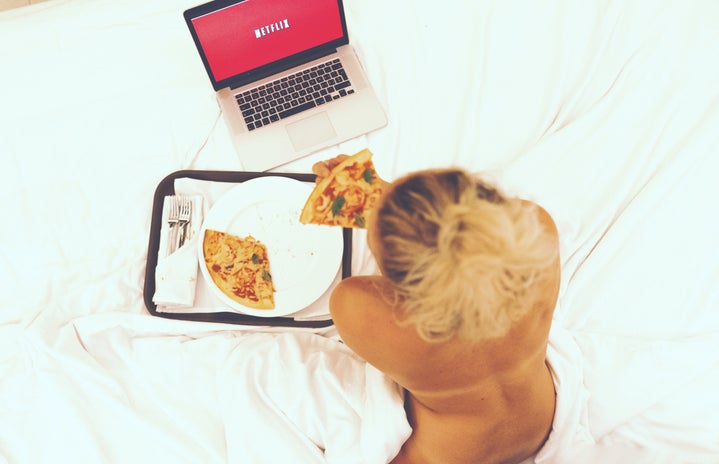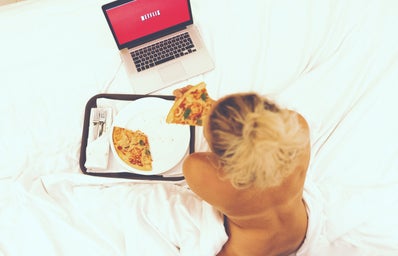Netflix recently released a series called “Insatiable.” Starring Disney star Debby Ryan, it received a lot of attention, both negative and positive (mostly negative). I saw a lot of the conversation over the show on my social media feed, primarily Instagram, and was curious. Why was this show sparking so much controversy? What was so bad about it? While some people loved the show, others criticized it for its fatphobic underlying messages. Unsure about where I stood on the issue, I decided to binge the entire show. Here are my takeaways.
For a summary of the show, check out this link here.
I’ll start with the positives. This show, running 12 episodes, tackles a variety of topics such as body image issues, eating disorders, LGBT+ identity confusion, and the general idea of not feeling quite right in your own body. I appreciate the realness with which Debby’s character Patty grapples with her body even after losing 70 lbs. As someone who has dealt with issues around body image and my relationship with food, her feelings on it felt real–or at least relatable to me. Patty cycles through feeling the “power of skinny” and feeling helpless to binge eating or that her body still isn’t good enough, and that somehow makes her unworthy. Of what, I’m not entirely sure.
While I won’t name any specific characters for fear of spoiling it for you, a twist arises in the episodes in which a character is revealed to be gay/bi. Well, two characters, actually. One has been hiding it for years while the other is just suddenly coming to know this part of themself. It is really clear how this new information shakes the character’s world, turning around everything they thought they knew about themselves and the people around them. I appreciate that this struggle with sexuality and sexual identity didn’t feel particularly cliche. I appreciate that the character didn’t easily come to accept this realization, that instead it presented itself as a complicating factor, because sometimes what our heart wants doesn’t align with our life plans and it’s hard to find the compromise.
In another scene, Patty is in the bathroom pulling and poking at her stomach and thighs. A trans female stands next to her and tells her that she has a beautiful body. The two proceed to have a conversation about not really feeling right in their respective bodies. I think that their conversation did a good job of both normalizing trans individuals and inspiring female solidarity and positivity.
Alright. Now for the things I took issue with.
I finished the series in a relatively short period of time. By the end of it, I could not tell what genre this show was supposed to be or what its intended demographic is. At first, the show felt a lot like a Disney comedy, similar to what Ryan had done in the past. Then it became really real, dramatic, intense. I could accept that since I like shows that take a second to get real amidst comedy. But then they threw me for a loop when they show took on major elements of crime/horror. Patty’s character gets dark, and not in a way directly related to her body issues. I don’t have a problem with those individual elements; in fact, I really enjoy dramatic shows and crime-related shows. But the combination of so many general emotions and feelings left me feeling confused and a little overwhelmed. The variety of climax points that came up and the nature of a variety of the problems left me feeling *very* confused as to who, exactly, this was intended for. Pre-teens girls? High school girls? College girls? It felt like it was trying a touch too hard to appeal to all of those groups.
My draw to the show felt really similar to what draws me to reality tv. Its first pull is that it has that shock value that reality tv shows have, like “Bad Girls’ Club” or any of the “Real Housewives” series. However, instead of falling into a lull with repetitive plot points, “Insatiable” attempts to combat that by having many, many plot points and twists. It sounds exciting. It’s not. It was like being on a roller coaster except every 15 seconds you’re jerked on an unexpected turn, loop, or sudden drop. I’m surprised I didn’t get whiplash, watching it as condensed as I did. Perhaps their intention was to have the plot twists to maintain excitement as an individual watches it at an appropriate, reasonable rate. If I had watched it that way, maybe my opinions would be different. But I can’t unwatch 12 episodes, so my opinion stands.
Finally, my biggest critique. This show’s praise came largely from the fact that it focuses on body image issue and the struggle some individuals face as they fight body issues and eating disorders. I agree that it’s great that they took that on. I think representation is really powerful, and especially in today’s technological world, messages can be spread effectively through the media. However. Patty and her pageant coach Bob Armstrong in particular continuously fell to, referenced, and called on this messed up idea of “skinny is magic” as seen first in episode 2. I… take so many issues with it. I understand that our society today tends to treat the white, the wealthy, the skinny better than others at first glance. I can see and understand that that was likely what they were trying to reference. But they overdid it. That’s the nicest way I can put it. Instead of calling it out to criticize it, the show reinforced the idea that skinny is magic, that a person’s self-worth is heavily connected to whether or not they have the body that society deems acceptable. Patty’s best friend Nonnie pops off with a line about how Patty was beautiful before she lost all of her weight, one of the few moments directly pointing the lack of connection between beauty and size. There are small moments of criticism, speaking to the ideas that character is not shaped by outward appearance and that your self-worth is not dependent upon what society deems ideal. However, those moments are often overshadowed, and I found that a bit disappointing.
Ultimately, I don’t think the show was horrible. I found it entertaining, if not especially good. I think it’s a good show to watch if you want some drama, but that you can expect to end it with a slightly exhausted feeling and a metaphorically unpleasant taste in your mouth.


